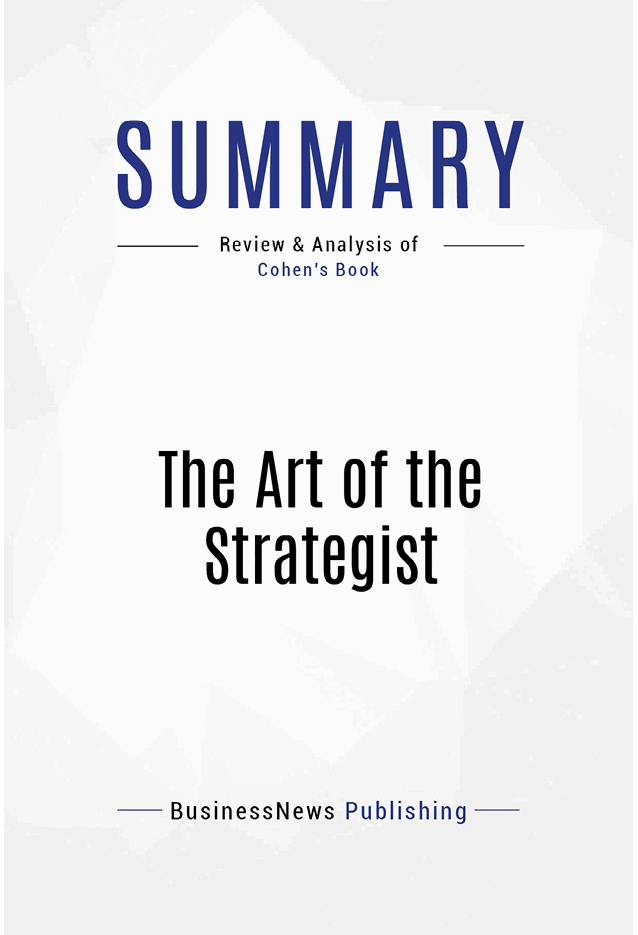Book Presentation:
The Art Of The Strategist
by William Cohen
Book Abstract
MAIN IDEA
Why is it that some companies flourish whereas other firms with much better resources never seem to realize their true potential? When you strip away all the trappings and irrelevant factors, youll find that winners consistently execute a thoughtful strategy better than their competitors. If these successful strategic principles can be codified and emulated, you will increase your chances of achieving comparable levels of success.
The word strategy is actually derived from a Greek word strategos which means the art of the general. The study of strategy did not start with the evolution of commerce, but actually began with warfare which has been waged for 7,000-years. It is absurd, however, the say that business is war because:
- The consequences of failure are completely
different for war and business.
- War is not a continuous activity whereas a successful
business goes on and on indefinitely.
- Speed is critical to the success of a war strategy, but
frequently plays little or no part in good business practices.
Rather than using warfare as a model for business strategy, a smarter approach is to look for the key strategic principles which have come to prominence in the military and to analyze them for lessons that are useful to business. The essential principles of strategy are universal, and apply to all areas of human endeavor - not only war and business but also games, politics and romance.
I am not a proponent of business is war. However, I do not think it is smart to ignore 7,000-years of genius-level thinking on strategy simply because its focus is on warfare. I am certainly not advocating warfare as a means of advancing technology or human benefit, but I do advocate using important lessons learned regardless of their source. Great thinkers through the ages and different military and other experts from many countries have recommended numerous principles of strategy that lead to success. However, these principles frequently differ, and attempted adaptation of any single set, while providing insight, would not be universal to all organizations or situations, much less to business. Through in-depth analysis and comparison among different sets of principles, analysis of strategic situations through the ages, and confirmation and refinement through empirical research, I have determined ten essential principles that are the basis of all successful strategy. They are distilled from the thinking of the greatest strategists who have ever lived in many areas of human activity.
William Cohen
While the essential principles of strategy are often overlooked because they seem so simple, successful businesses do follow common threads of strategy, even when they dont realize it. Their actions, taken either consciously or subconsciously, confirm the universal applicability of these strategic principles. The lessons of the great thinkers and practitioners from history are as applicable today as they have been throughout time. The basic strategy principles used by all successful organizations are so powerful their varied interpretations are conspicuous not so much for their differences as for their similarities.
William Cohen
About the Author
WILLIAM COHEN is president of the Institute of Leader Arts and professor of business administration at the Toronto University International. Dr. Cohen, a graduate of the United States Military Academy at West Point, the University of Chicago and Claremont Graduate University, is a retired Major General from the U.S. Air Force Reserve. In addition to his military career, Dr. Cohen has served as director of research for Sierra Engineering Company and as manager of advanced technology marketing at McDonnell Douglas Astronautics Company. Dr. Cohen is an accomplished keynote speaker and authority on leadership, strategy formulation and deployment. He is the author of more than 50 books including The New Art of Leader, The Stuff of Heroes and The Wisdom of the Generals.
Dr. Cohens Web site is at www.stuffofheroes.com .
Important Note About This Ebook
This is a summary and not a critique or a review of the book. It does not offer judgment or opinion on the content of the book. This summary may not be organized chapter-wise but is an overview of the main ideas, viewpoints and arguments from the book as a whole. This means that the organization of this summary is not a representation of the book.
Summary of
The Art Of The Strategist (William Cohen)
1. The 10 Essential Principles of Strategy
1. Commit fully to a definitive objective
The fundamental principle of strategy is to specify what exactly you want to achieve. Until you commit to a definitive objective, nothing else will happen.
An effective strategy always brings physical, mental and moral forces together synergistically to achieve something concrete. To win over your competition, you have to find ways to combine all three forces so they act in a unified direction.
To increase your own personal commitment to strategy:
- Think through your goals in detail - until you get to the stage where you can clearly explain your goals to yourself and to those who will help you reach them. You cannot effectively promote your goals to others until you can explain them clearly and unambiguously.
- Make a public commitment your goal or objective - so there will be no turning back. Most people avoid doing this for fear of appearing foolish, but this is a principle of power and effectiveness. Probably the best example of this was President John F. Kennedy who said before a joint session of Congress on May 25, 1961: I believe that this nation should commit itself to achieving a goal, before this decade is out, of landing a man on the moon and returning him safely to earth.
- Promote your goals and objectives actively and consistently - every time you talk to anyone about the subject. Make certain there can be no doubting your personal commitment to your objective, and your faith it will come together as planned. Promote your goal at every opportunity.
- Anticipate that obstacles will crop up along the way - and be prepared to deal with them effectively rather than taking that as a sign your strategy is flawed. Anticipate what problems are likely to appear and think through potential solutions in advance. Write down the benefits of achieving your final objective and review those benefits frequently, especially when obstacles materialize. That will reinforce the feeling that what youre working towards is genuinely worth the effort.
- Be prepared to adjust your strategy as necessary - but not your ultimate objective. In other words, commit to achieving your objective but acknowledge how you ultimately get there may pan out differently from what you first projected. Its the goal thats important, not how you get there.
If I always appear prepared, it is because before entering an undertaking, I have meditated for long and have foreseen what may occur. It is not genius, which reveals to me suddenly and secretly what I should do in circumstances unexpected by others. It is thought and meditation.
Napoleon Bonaparte





